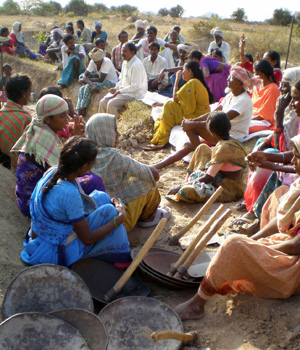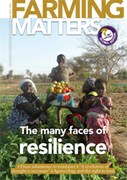India’s Mahatma Gandhi National Rural Employment Guarantee Act (MGNREGA) is the largest public-works based employment programme in the world. Unanimously enacted by the Indian parliament in 2005, implementation began in February 2006. With an annual budget of six billion US dollars, it now supports some fifty million rural people – larger than the population of Senegal, Mali and Niger combined. This article focuses on the successes, issues and potential of the Act to improve the well being of workers and family farmers.

Rural India has a considerable landless population, often leasing farming land, but a much larger number of smallholder farmers who presently earn much of their income from off-farm labour.
Rainfed agriculture accounts for 40% of Indian food production, occupying half of India’s arable land and is home to the majority of the rural poor. People in these areas are suffering recurring droughts, increasing debts, migration, rising farmer suicides, and a lack of public and private investments.
Furthermore, land use patterns are drastically shifting with the increasing sales of agricultural land to companies and rich urbanites.
The vision
MGNREGA has two explicit goals. These are to provide employment and income, and to create productive assets. The former is immediate and ameliorative, while the latter builds infrastructure and sustainably improves rural livelihood opportunities.
One of the main aims is to provide a universal guarantee of 100 days paid work per year for the rural households involved, with employment on demand within 15 days or workers are entitled to unemployment allowance. Men and women should receive equal pay, linked to the minimum wage and the consumer price index.
The Act puts village institutions such as gram sahha and gram panchayat at the centre of decision making, helping to strengthen decentralized governance. Permissible work includes soil and water conservation, natural resource development and infrastructure improvements such as sanitation, roads and community centres. It also allows work on private land for the very poor. Guidelines stipulate a twice-yearly social audit with transparency and accountability guaranteed through the Right to Information Act.
A bumpy road so far
After eight years of implementation, Indian policy makers, officials and NGOs are now questioning how they can reinvigorate the initial enthusiasm that accompanied the launch of this ambitious Act.
MGNREGA has substantially increased agricultural wages, especially for women, but the average annual employment per household has only reached 50 days, half of the final target. But it has been shown that the additional income has been used as capital, to increase the productivity of family farms.
Meanwhile, critical challenges remain, and many practical issues that are crucial to rural workers and farmers have still not been overcome, affecting trust and confidence. Periods of employment are considered too short and wages are not always paid in a timely manner.
A precondition for addressing these challenges is to stamp out the prevailing culture where politicians are harvesting votes, policy makers are fire fighting peripheral issues, while bureaucrats are busy making money.
Acting on the Act
The vision embodied by the MGNREGA must be receptive to the knowledge and objectives of rural workers and family farmers and is critical for building resilient communities. Investments not yet considered that would better fit the needs of rural communities include providing women with work tools to enhance their status and to reduce drudgery, upgrading workers’ skills to meet the emerging labour market, and exploring farming techniques that enhance water use efficiency.
Family farmers have the ability to trigger the transformative potential of MGNREGA. Family farmers have rich and eco-friendly ideas that can be built upon with the addition of science and technology. This is possible however, only when academics, researchers, political leaders and NGOs actively engage with family farmers while respecting their autonomy and sense of dignity. Ultimately, improving the well being of rural workers and family farmers will have a cascading impact on food security, productivity, inclusive growth and gender equality in rural India. And the Act has the potential to play a significant role.
KS Gopal
KS Gopal works for the Mahatma Gandhi National Rural Employment Guarantee Act (MGNREGA).
Email: cecgopal@yahoo.com

